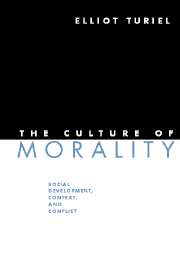Book contents
- Frontmatter
- Contents
- Preface
- 1 Introduction
- 2 Striving for Community
- 3 Discontents Revisited
- 4 Social Judgments and Social Contexts
- 5 The Development of Moral and Social Judgments
- 6 Social Thought and Social Action
- 7 Social Harmony and Social Conflict
- 8 Justice, Heterogeneity, and Cultural Practices
- 9 Social Hierarchy, Subordination, and Human Capabilities
- 10 Perspectives on Cultural Practices: More Than One
- 11 Subversion in Everyday Life
- 12 Conclusion
- References
- Index
10 - Perspectives on Cultural Practices: More Than One
Published online by Cambridge University Press: 05 June 2012
- Frontmatter
- Contents
- Preface
- 1 Introduction
- 2 Striving for Community
- 3 Discontents Revisited
- 4 Social Judgments and Social Contexts
- 5 The Development of Moral and Social Judgments
- 6 Social Thought and Social Action
- 7 Social Harmony and Social Conflict
- 8 Justice, Heterogeneity, and Cultural Practices
- 9 Social Hierarchy, Subordination, and Human Capabilities
- 10 Perspectives on Cultural Practices: More Than One
- 11 Subversion in Everyday Life
- 12 Conclusion
- References
- Index
Summary
Even when a baby is born, people are glad if it's a boy, and less glad if it's a girl. We live in a conservative culture. Maybe in the future I might want to treat my daughter in the same way as I would treat my son, but the culture wouldn't let me do it.
—18-year-old Druze femaleNaawal El Saadawi and Hallah Sarhan, like many other women with whom Jan Goodwin spoke, made it clear that they think that self-interest, the pursuit of personal needs and desires, a sense of entitlement, and the assertion of power – all characteristics attributed to individualism – are at the forefront of many cultural practices that entail restrictions on the activities of females. Many of those women were unwilling to accept such practices and social arrangements, expressing equally clear moral judgments about their unfairness and the negative consequences for women's welfare. For some of the women, as we have seen, there is ambivalence as well. Ambivalence was expressed, for instance, by women who disliked and were upset by polygamy and yet saw it as having benefits. Some strive for women's rights and still seem to accept polygamy. An example is the wife of a powerful Sheik of Kuwait who is a human rights and women's rights activist and whose writings were banned on two occasions. At the same time, she accepted that her husband had many wives and concubine slaves.
- Type
- Chapter
- Information
- The Culture of MoralitySocial Development, Context, and Conflict, pp. 223 - 260Publisher: Cambridge University PressPrint publication year: 2002



